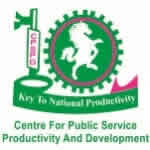|
|
The Art of Building a Customer Centric Organisation Course
By: Centre for Public Service Productivity and DevelopmentLagos State, Nigeria 08 - 10 Apr, 2025 3 days
NGN 285,000Get 5.00% off
|
Venue: Lagos
Other Dates
| Venue | Date | Fee | |
|---|---|---|---|
| Lagos, Lagos State, Nigeria | 08 - 10 Jul, 2025 | NGN285000 | |
| Lagos, Lagos State, Nigeria | 14 - 16 Oct, 2025 | NGN285000 |
Amazing Tips, Tricks and Secrets That Will Make Sure Your organization. Don’t Just Survive But THRIVE During Economic Downturns!
Good customer service can be considered as the big differentiator between firms. While competing products are often similar and can anyway be easily duplicated, good customer service is a holistic system, requiring a sustained organization-wide effort, driven by the top and permeating all aspects of the organization culture. The resulting customer-centric organization becomes a formidable competitor whose model cannot be easily copied. In this course, we look at what it takes to build a customer centric organization.
This course also focuses on the importance of providing exceptional internal and external customer service and the impact of doing this. Moreover, you will thoroughly have the chance to discuss the effects of stress at the workplace and ways to turn stress to an advantage. You will also learn how mastering your effective usage of time will inevitably enhance your productivity and lower your stress level. Finally, you will learn in detail, how you can improve your phone handling capabilities.
Course Objectives
At the end of this course delegates would have mastered:
- Customer orientation
- Conceptual thinking
- Balanced decision making
- Quality orientation
- Understanding of prospects’ motivation
- Persuading others
- Self development
- Interpersonal communication
- Business writing
- Customer focus
- Self management
- Time management
- Telephone handling
- Engage in a continuing learning process through the interaction with peers in related topics, as individuals and as team members.
Course Outlines
- Teamwork and communication skills developed from, with, and honed through assessment and practice throughout the program of studies encouraged and valued in all aspects of learning
- Intercultural and ethical competency adept at operating in other cultures comfortable with different nationalities and social contexts
- Self-awareness and emotional intelligence
- A capacity for self-reflection and a willingness to engage in self-appraisal
- Open to objective and constructive feedback from supervisors and peers able to negotiate difficult social situations, diffuse conflict and engage positively in purposeful debate
- Defining and appreciating the customer
- Definition of customer
- Definition of customer service
- The internal and external customer
- Importance of the internal customer
- The need for motivated employees
- The need for qualified employees
- Silo mentality
- Destroying the silos
- Customer service as a strategic imperative
- From ‘suspect’ to ‘partner’
- Going up the ladder
- The 'KANO' model
- ‘Basic’ attributes
- ‘Performance’ attributes
- ‘Delight’ attributes
- The customer centric organization
- Customer service as a strategic imperative
- The 7 practices of customer-centric organization
- Customer satisfaction surveys and other vital tools
- Understanding your customers
- Importance of segmentation
- Principles of customer segmentation
- Focus groups
- Customer satisfaction surveys
- Key terms
- Major survey methods
- Questionnaire examples
- Customer survey guidelines
- Types of satisfaction surveys
- Basics of sampling
- Attributes to measure
- Customer satisfaction index
- 'RATER' in depth
- Service quality (servqual) gaps model
- Customer complaints and service recovery
- Facts and their implications
- Symptom versus cause
- Root cause analysis
- Failures do happen
- The recovery paradox
- The strategic initiative
- Tactical activities
- The ‘WOW!’ factor
- Service Level Agreements (SLAs)
- SLA definition
- Characteristics of effective SLAs
- Key elements of SLA
- Steps in SLA development
- Quality versus cost
- SLA metrics
- KPIs for customer service
- Monitoring performance through key performance indicators
- The 4 perspectives of the balanced scorecard
- Impact of the customer perspective
- Characteristics of good KPIs
- Building customer service KPIs
- Effective verbal and written communication skills
- Improving credibility and gaining recognition
- Importance of having positive attitude
- Being assertive
- Selling your ideas to the boss, colleagues, subordinates and clients
- Preparing a professional presentation
- What constitutes professional business writing
- Style and layout
- Obtaining your objective with the reader
- Expectations of readers
- Serving the internal and external customer
- Understanding the needs of internal and external customers
- Removing services barriers
- Providing excellent service
- Breaking down the silo mentality
- Handling complaints
- Stress management techniques
- Causes and symptoms
- Identifying your stressors
- How stress affects performance
- Formulating a comprehensive stress management plan
- Managing time
- Identifying and eliminating time wasters
- Setting goals and priorities
- Using measures to control and improve your effectiveness
- Planning and managing time for self and others
- Preparing time logs and learning from them
- Using the telephone properly
- Professional telephone behavior
- Rules for good listening
- Steps in professional handling of an incoming call
- Dealing with difficult callers
- Identifying common phone problems and formulating solutions
Who Should Attend?
Customer Service Professional, Customer Service assistants, administrators and supervisors of junior level employees, Executives, managers and decision makers who are keen on improving performance by taking their customers to higher levels of satisfaction, as well as customer service managers and supervisors interested in advanced customer service tools.
Methodology
Case studies, self-evaluation exercises, application of service quality tools, video clips with debriefs, oral and written questions resulting in debates and more are all used in this course in addition to brief consultant and participant presentations.
Course Booking
Please use the “book now” or “inquire” buttons on this page to either book your space or make further enquiries.
| Lagos | Apr 08 - 10 Apr, 2025 |
| Lagos, Lagos State, Nigeria | 08 - 10 Jul, 2025 |
| Lagos, Lagos State, Nigeria | 14 - 16 Oct, 2025 |
| NGN 285,000.00 | (Foreign Participant ($550) The program fees covers tuition, Course Materials, Tea/Coffee and Break, Lunch, Bag, Certificate of participation and administration) |
Dr Chris Egbu +2348023194131
Related Courses
 Developing Framework for Strategic Thinking and Good Governance in Higher Education
Developing Framework for Strategic Thinking and Good Governance in Higher Education
5 days, 19 - 23 May, 2025
Centre for Public Service Productivity and Development
 Data Analysis and Management Workshop for PRs Officers
Data Analysis and Management Workshop for PRs Officers
3 days, 01 - 03 Jul, 2025
Centre for Public Service Productivity and Development
 Data Analysis for Business Future Prediction and Decision Making
Data Analysis for Business Future Prediction and Decision Making
4 days, 27 - 30 May, 2025
Centre for Public Service Productivity and Development
 Cash Accounting Management and Control Course
Cash Accounting Management and Control Course
3 days, 27 - 29 May, 2025
Centre for Public Service Productivity and Development
Currency Converter



